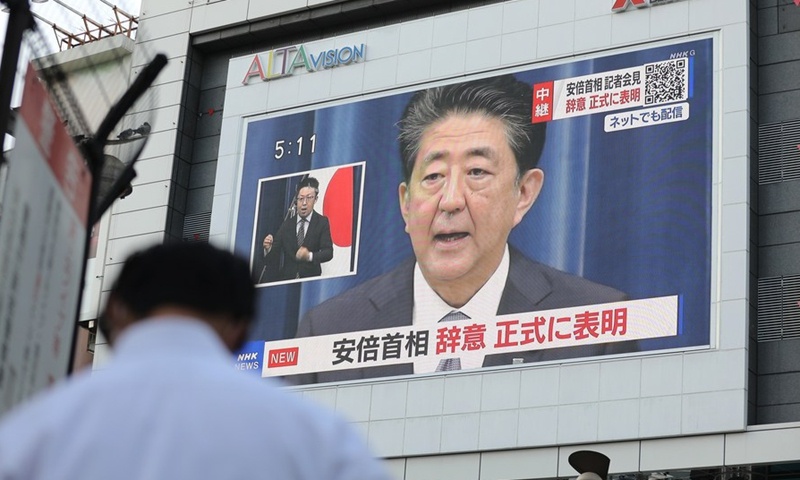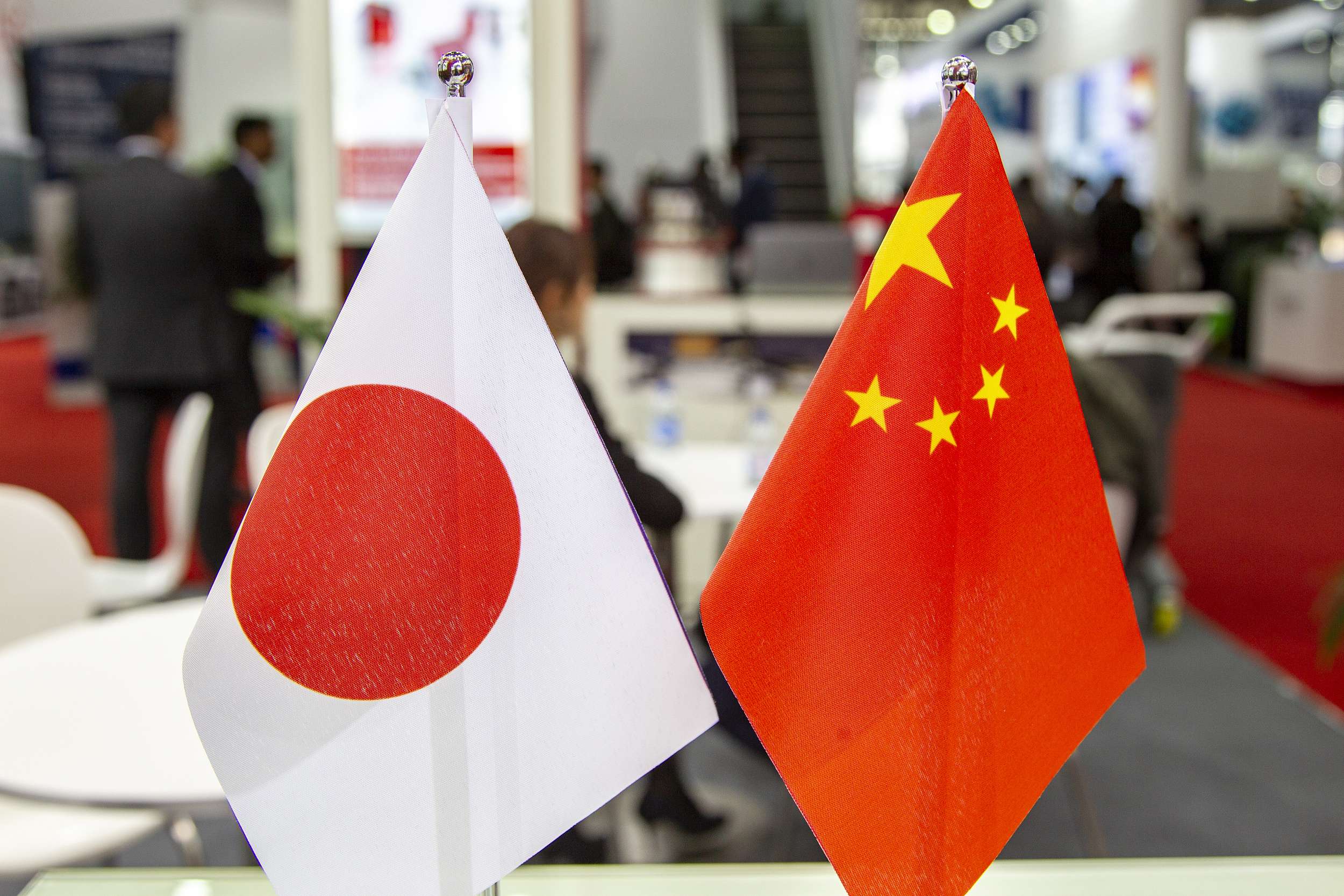
An electronic screen shows that Japanese Prime Minister Shinzo Abe speaks at a press conference in Tokyo, Japan, on Aug. 28, 2020. (Photo: Xinhua)
Shinzo Abe, who just stepped down as Japan’s Prime Minister last Wednesday, visited the Yasukuni Shirne on Saturday, triggering a flood of criticism on Chinese social media with some analysts asserting the visit could set a “very bad example”, shadowing the new Japanese government.
Abe said on his Twitter account that he visited the shrine to report his recent resignation from the post of Japanese prime minister to his ancestors.
Chinese netizens said the move shows that Japanese right-wing politicians have yet to faithfully reflect on their country’s war crimes during World War II even as they try to be friendly towards its neighbors including China.
Other netizens noted that the visit is just “a gesture” by Abe to his ancestors, and Abe’s past efforts to promote China-Japanese ties and enhance bilateral exchanges should not be dismissed.
According to media reports, Abe only visited the shrine once as Japan’s prime minister in December 2013.
Abe’s latest visit to Yasukuni Shrine on Saturday shows that some Japanese politicians try to curry favor with the nationalist elements in the country. If there wasn’t the need to improve Japan’s relations with China and South Korea, Abe would have visited the shrine while he was in office this year, Da Zhigang, director and research fellow of the Institute of Northeast Asian Studies at the Heilongjiang Provincial Academy of Social Sciences and chief expert at the Northeast Asian Strategic Studies Institute, told the Global Times on Saturday.
Zhou Yongsheng, professor of China Foreign Affairs University, said that Abe wants to demonstrate his ideological and political ethos through the shrine visit, stressing that those worshipped at the shrine have been deemed to have “made sacrifices for the country".
Zhou told the Global Times on Saturday that Abe is trying to make up for shunning the shrine in the past few years because he was not able to visit it since 2013 due to China and South Korea’s fierce opposition. He also is making a gesture to Japanese right-wing forces who were disappointed by his failure to visit the shrine in these years.
He also wants to show a hard line to China and South Korea on historical issues, Zhou noted.
Abe’s visit sets a bad example and is not less significant than if he were still in power, Da said. He has sent a negative signal to the new cabinet, the current Prime Minister Yoshihide Suga, and the Japanese society.
A politician shouldn’t do things in one way when in office then put on another face after stepping down, Da said.
Zhou said Saturday’s shrine visit could be a hint from Abe to the new Prime Minister Yoshihide Suga, suggesting that Abe wants Sugato know he shouldn’t visit the shrine while in the post of prime minister .
Zhou noted that although Abe has stepped down, he still has huge influence and his visit on Saturday would cast a far-reaching impact on Japan’s future leaders and politicians.
After Suga took office on Wednesday, the new cabinet consists of eight ministers from Abe's segment. The new defense minister, Nobuo Kishi, is Abe's younger brother and grandson of the late Prime Minister Nobusuke Kishi. Nobuo Kishi was adopted by his mother’s brother as a baby and carries his uncle’s surname.
“Basically you can say that the new cabinet has the same members as Abe’s. So you can see how influential Abe is,” Zhou said.
Zhou noted that Abe will continue to impact Japanese politics due to his great prestige. There is even a possibility that Abe could return to serve as a congressperson, suggested Zhou.
The visit occurred the same day former Japan Prime Minister Yoshiro Mori is scheduled to visit the island of Taiwan and attend the memorial ceremony for former Taiwan leader Lee Teng-hui, who is considered by vast Chinese mainlanders as the “godfather of Taiwan separatism. Lee, 97, died on July 30.
Mori’s visit to Taiwan might be out of a consideration of etiquette, but given the sensitive cross-Straits ties, it harms the political mutual trust between China and Japan. The Taiwan question is essential to China and the Chinese people, and such a move will subtly affect China-Japan relations and the cross-Straits situation, Da said.
Apart from etiquette and so-called personal friendship, as media on the Taiwan island reported, Mori’s administration also danced to the US’ tune as the US was increasing exchanges with Japan, trying to containChina.
US Undersecretary of State Keith Krach also arrived in the island of Taiwan on Thursday for the memorial service on Saturday for Lee. Krach is the most senior US State Department official to visit Taiwan island since 1979.
Mori wants to test how the Chinese mainland will act to the visit but as he currently does not have any post in the government, his test is comparatively milder than the gesture made by the US’, Zhou said.

Photo: VCG
Despite Abe’s visit to the shrine and Mori’s visit to Taiwan island, Chinese experts are still confident that it is unlikely China and Japan will have disputes over historical issues under Suga’s leadership, experts said.
Suga is more of a bureaucratthan a politician and will follow procedures and regulations, Zhou explained. Meanwhile, he noted that Suga would try to defend Japan’s national interests as Abe did over the disputedDiayu Islands.
Chinese experts stressed that China-Japan ties have been generally warmer over the past few years under Abe’s leadership, which is also reflected in the two country's people-to-people exchanges. Increasing favorable and friendly ties between the two peoples should not be interrupted after the new administration takes office, they said.


